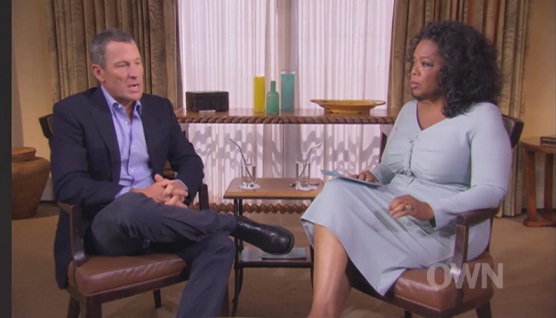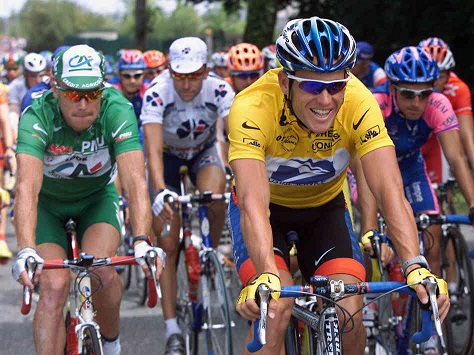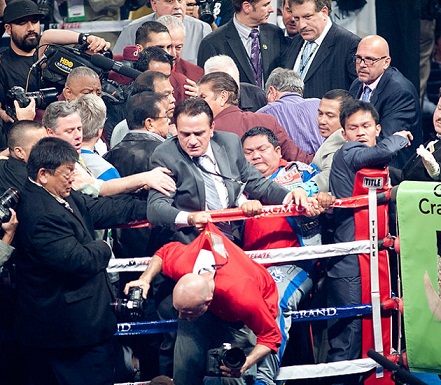
Oprah interviews Lance Armstrong
It’s the lying. It’s the disappointment that the character that I once admired so much turned out to be dark and stained.
I’m always in awe of people who triumph over adversities.
I was an ardent admirer of Lance Armstrong.
I read and re-read his book, “It’s not about the Bike- My Journey Back to Life” which has been described as an “awe-inspiring tale of immense courage and will.”
I bought a number of those yellow Livestrong ballers to support his foundation, Livestrong, that aids cancer victims.
Armstrong was hailed as the greatest cyclist on earth. He was a seven-time champion of the grueling and prestigious Tour de France. This, despite his having been diagnosed with testicular cancer that had spread to his brain and lungs at age 25. His cancer treatments included brain and testicular surgery and extensive chemotherapy.
Maybe my admiration of him was partly because he was a fellow cancer survivor.
My deep disappointment with the expose, which he admitted in last week’s interview with Oprah, that he had taken banned drugs to improve his performance as a cyclist, was because surviving cancer is like being given a new lease in life.
When you are told you have cancer, you prepare for your death. And when you survive, you value life more. You owe it to God to live a life of truth.
That’s not what he did. He became more vain and worldly, obsessed with titles. He admitted he was a “flawed character.”
He told Oprah: “My ruthless desire to win at all costs served me well on the bike but the level it went to, for whatever reason, is a flaw. That desire, that attitude, that arrogance.”
In an interview that should be required viewing to all journalists, print and broadcast (paging Ricky Lo), Oprah was able to elicit admission from Armstrong of his wrongdoing.
 Done in Armstrong’s home in Austin, Texas, Oprah started with “yes” or “no” questions:
Done in Armstrong’s home in Austin, Texas, Oprah started with “yes” or “no” questions:
Oprah Winfrey: Did you ever take banned substances to enhance your cycling performance?
Lance Armstrong: “Yes.”
OW: Was one of those banned substances EPO?
LA: “Yes.”
OW: Did you ever blood dope or use blood transfusions to enhance your cycling performance?
LA: “Yes.”
OW: Did you ever use any other banned substances such as testosterone, cortisone or Human Growth Hormone?
LA: “Yes.”
OW: In all seven of your Tour de France victories, did you ever take banned substances or blood dope?
LA: “Yes.”
OW: Was it humanly possible to win the Tour de France without doping, seven times?
LA: “Not in my opinion. That generation. I didn’t invent the culture, but I didn’t try to stop the culture.”
The part that I find disturbing was where Armstrong said he didn’t feel there was nothing wrong when he was being hailed a hero despite his doing illegal acts:
OW: Was there happiness in winning when you knew you were taking these banned substances?
LA: “There was more happiness in the process, in the build, in the preparation. The winning was almost phoned in.”
OW: Was it a big deal to you, did it feel wrong?
LA: “No. Scary.”
OW: It did not even feel wrong?
LA: “No. Even scarier.”
OW: Did you feel bad about it?
LA: “No. The scariest.”
In It’s Not About the Bike, Armstrong wrote: “It (cancer) taught me how to cope with losing. It taught me that sometimes the experience of losing things, whether health or home or an old sense of self,has it’s own value in the scheme of a life.”
Maybe, now that he is in deep shit, he will learn that lesson that cancer taught him.
Related links:
Media unforgiving: http://www.bbc.co.uk/sport/0/cycling/21100102
 Pictured above (from L-R) are Andrew Neri (MILO Sports Executive), Robbie de Vera (MILO Sports Executive), Meg Panopio (MILO Mixes Brand Manager), Michelle Alvarillo (Business Executive Manager for Beverages), Janice Yang (MILO Mainstream Brand Manager), Pia Solis (Marketing, Promotions & Events Manager), Yvette Papasin (Marketing, Promotions & Events Cluster Head), and Justin Mendoza (Marketing, Promotions & Events Manager).
Pictured above (from L-R) are Andrew Neri (MILO Sports Executive), Robbie de Vera (MILO Sports Executive), Meg Panopio (MILO Mixes Brand Manager), Michelle Alvarillo (Business Executive Manager for Beverages), Janice Yang (MILO Mainstream Brand Manager), Pia Solis (Marketing, Promotions & Events Manager), Yvette Papasin (Marketing, Promotions & Events Cluster Head), and Justin Mendoza (Marketing, Promotions & Events Manager).



